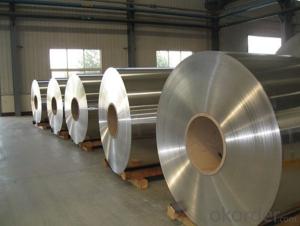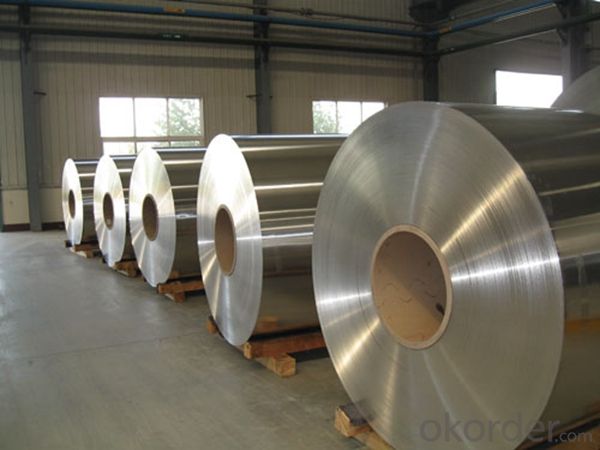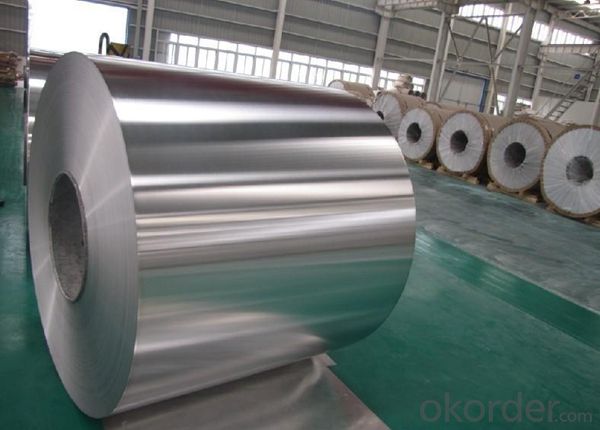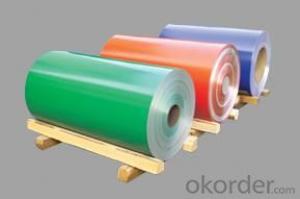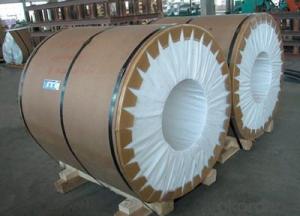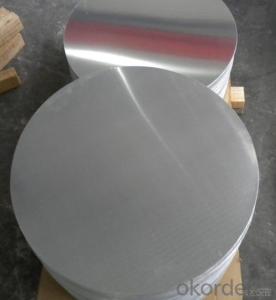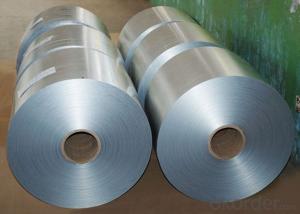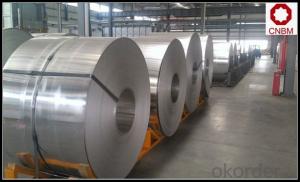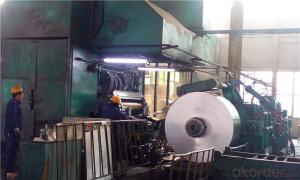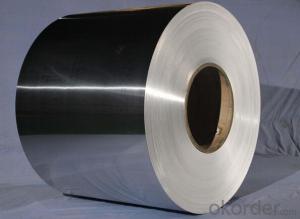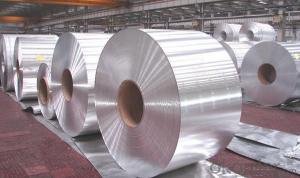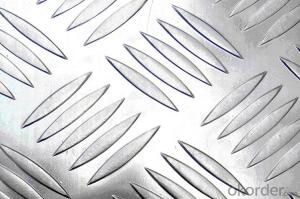Color Coated Aluminum Coil - Mill Finish Aluminum 3003 H14 China Factory Direct Supply
- Loading Port:
- Shanghai
- Payment Terms:
- TT OR LC
- Min Order Qty:
- 5 m.t.
- Supply Capability:
- 1000 m.t./month
OKorder Service Pledge
OKorder Financial Service
You Might Also Like
Specification
1. Specification of Mill Finish Aluminum 3003 H14 China Factory Direct Supply
Alloy Number | AA5XXX |
Temper | H12, H14, H16, H18, H22, H24, H26, H32, HO, F |
Thickness | 0.1mm – 500mm |
Width | 10mm- 2200mm |
Standard | GB/T3880-2006, ASTM, ISO, EU standard |
2. Application of Mill Finish Aluminum 3003 H14 China Factory Direct Supply
(1).Interior: wall cladding, ceilings, bathrooms, kitchens and balconies, shutters, doors...
(2).Exterior: wall cladding, facades, roofing, canopies, tunnels,column covers , renovations...
(3).Advertisement: display platforms, signboards, fascia, shop fronts...
3. Feature of Mill Finish Aluminum 3003 H14 China Factory Direct Supply
Surfact Quality :
Be free from Oil Stain, Dent, Inclusion, Scratches, Stain, Oxide Dicoloration, Breaks, Corrosion, Roll Marks, Dirt Streaks and other defect which will interfere with use,
Mechenical Property:
Chemical Composite and Mechanical Property
4. Certificate:
SGS and ROHS(if client request, paid by client), MTC(plant provided), Certificate of Origin(FORM A, FORM E, CO), Bureau Veritas and SGS (if client request, paid by client), CIQS certificate
5. Image of Mill Finish Aluminum 3003 H14 China Factory Direct Supply
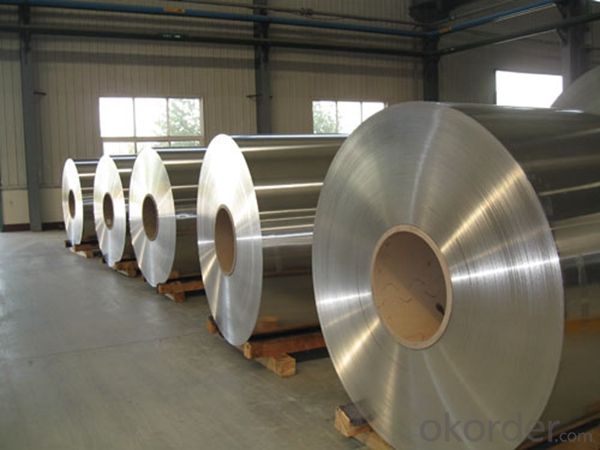
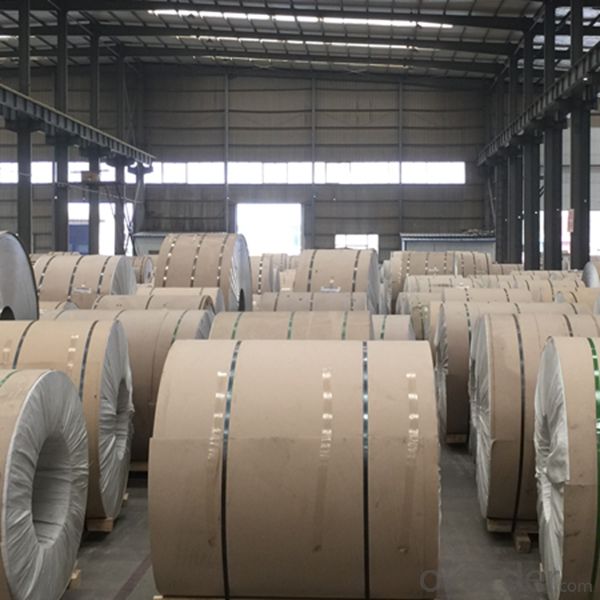
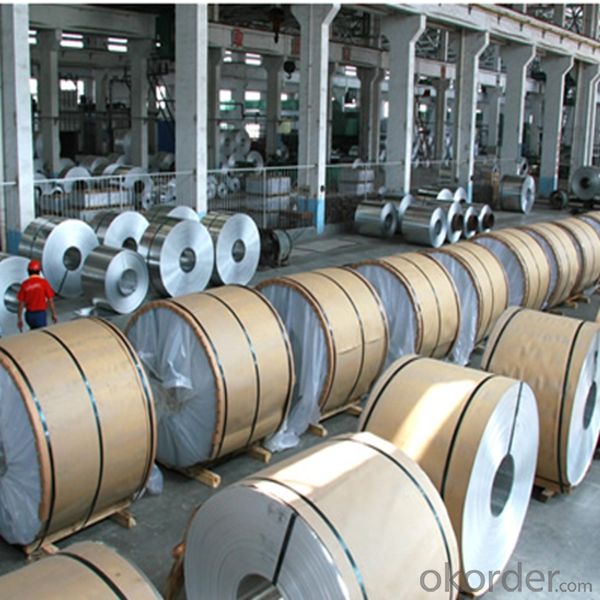
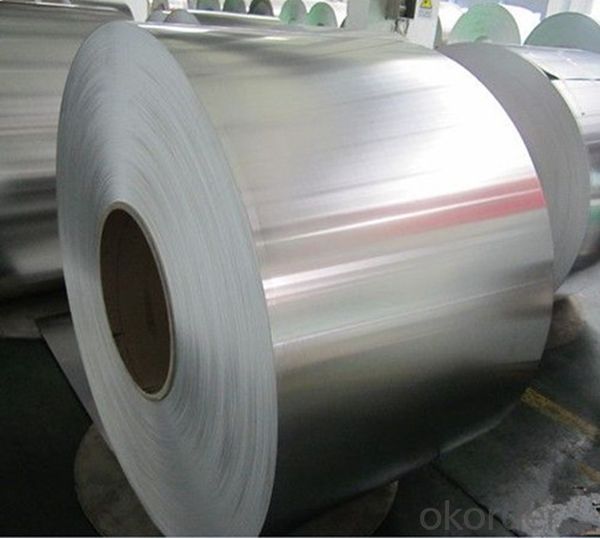
6. Package and shipping of Mill Finish Aluminum 3003 H14 China Factory Direct Supply
First, plastic cloth with drying agent inside; Second, Pearl Wool ; Third, wooden cases with dry agent , fumigation wooden pallets, aluminum surface could cover blue PVC film
7. FAQ
1) What is the delivery time?
Dpends on actual order, around 20 to 35 days
2)What is the QC system:
We have QC staff of 20 persons and advanced equipment, each production is with MTC traced from Aluminum ingot lot.
3) What market do you mainly sell to?
Australia, America, Asia, Middle East, Western Europe, Africa etc
- Q: What are the rules or laws governing the use of aluminum coils?
- <p>Yes, there are regulations on the use of aluminum coils, which vary by country and industry. These regulations often pertain to safety, quality standards, and environmental impact. For instance, in the construction industry, aluminum coils used for roofing or cladding must meet specific standards for strength and durability. In food packaging, regulations may dictate the type of aluminum alloys used to prevent contamination. Additionally, there are environmental regulations that govern the disposal and recycling of aluminum coils to minimize their impact on the environment. Compliance with these regulations is crucial for manufacturers, suppliers, and users of aluminum coils to avoid legal penalties and ensure public safety.</p>
- Q: How do aluminum coils contribute to energy-efficient appliance manufacturing?
- Aluminum coils contribute to energy-efficient appliance manufacturing by offering several key advantages. Firstly, aluminum is a lightweight material that reduces the overall weight of appliances, making them easier to transport and reducing energy consumption during transportation. Secondly, aluminum has excellent heat transfer properties, allowing for more efficient heat exchange in appliances like refrigerators, air conditioners, and heat pumps. This leads to improved energy efficiency and reduced electricity consumption. Additionally, aluminum coils are highly durable and resistant to corrosion, ensuring longer appliance lifespans and minimizing the need for replacements. Overall, the use of aluminum coils in appliance manufacturing plays a significant role in enhancing energy efficiency and reducing environmental impact.
- Q: What are the necessary safety measures one should take while using aluminum coils in a kitchen setting?
- <p>When using aluminum coil in a kitchen, safety precautions include: 1) Ensuring proper ventilation to avoid inhaling fumes, as aluminum dust can be harmful. 2) Wearing protective gear such as gloves and goggles to protect your skin and eyes from potential contact with aluminum or sharp edges. 3) Handling the aluminum coil carefully to prevent cuts or injuries. 4) Avoiding contact with acidic or alkaline substances, as aluminum can react with them. 5) Not using aluminum coil near open flames or high heat sources, as it can melt or cause fires. 6) Cleaning up any aluminum dust or debris promptly to prevent slipping hazards. 7) Storing aluminum coils in a dry, cool place away from chemicals and heat sources.</p>
- Q: How do aluminum coils contribute to sustainable transportation?
- Aluminum coils play a crucial role in promoting sustainable transportation in several ways. Firstly, aluminum is a lightweight material, making it an ideal choice for various components in vehicles. By replacing heavier materials such as steel, aluminum coils help to reduce the overall weight of the vehicle. This, in turn, improves fuel efficiency and reduces greenhouse gas emissions. Furthermore, the use of aluminum coils in vehicle manufacturing helps to enhance the durability and longevity of the vehicle. Aluminum is highly resistant to corrosion, which is particularly beneficial in areas with harsh weather conditions or high levels of road salt. This longevity means that vehicles made with aluminum coils require less frequent repairs and replacements, reducing the amount of waste and resources consumed over the lifetime of the vehicle. In addition, the recyclability of aluminum is another significant factor in sustainable transportation. Aluminum is one of the most recyclable materials on the planet, with almost 75% of all aluminum ever produced still in use today. By using aluminum coils, manufacturers can incorporate recycled aluminum into their production processes, reducing the need for primary aluminum extraction. This not only conserves natural resources but also reduces energy consumption and greenhouse gas emissions associated with aluminum production. Moreover, aluminum coils contribute to sustainable transportation by enabling the advancement of electric vehicles (EVs). The lightweight nature of aluminum helps to improve the range and efficiency of EVs by reducing their energy consumption. Additionally, aluminum's excellent thermal conductivity allows for better heat dissipation in EV batteries, enhancing their performance and lifespan. Overall, the use of aluminum coils in transportation supports sustainability efforts by reducing vehicle weight, improving fuel efficiency, increasing durability, promoting recycling, and enabling the growth of electric vehicles. As the transportation sector continues to strive for reduced emissions and increased efficiency, aluminum coils will continue to play a vital role in achieving these sustainability goals.
- Q: What is the maximum coil diameter for aluminum coils?
- The maximum coil diameter for aluminum coils can vary depending on the specific application and industry standards. However, in general, aluminum coils typically have a maximum diameter of around 72 inches (6 feet) to ensure ease of handling and transportation.
- Q: Are there any specific installation requirements for aluminum coils?
- Aluminum coils have specific installation requirements that must be taken into account. When installing these coils, several factors need to be considered. First and foremost, it is crucial to provide adequate support and secure the coils properly during installation. Due to their weight, it is essential to prevent sagging or damage by using appropriate brackets or support structures. This ensures that the coils are firmly mounted. Secondly, the location and environment of the installation should be carefully assessed. Aluminum coils are commonly used in HVAC systems, so it is important to ensure that the installation area is free from any corrosive substances or chemicals that could harm the coils. Additionally, proper ventilation is necessary to prevent the accumulation of heat or moisture, as these factors can affect the coils' performance and lifespan. Moreover, it is imperative to adhere to the manufacturer's guidelines and recommendations for installation. These guidelines may include specific instructions regarding the type of fasteners or connectors to be used, the appropriate spacing between coils, and any other particular requirements for the specific aluminum coil being installed. By following these guidelines, the coils' optimal performance and longevity can be ensured. Lastly, it is highly advisable to enlist the services of a professional with experience in handling and installing aluminum coils. This will minimize the risk of any issues or damage resulting from incorrect installation. In conclusion, specific installation requirements for aluminum coils encompass proper support, consideration of the installation environment, adherence to manufacturer guidelines, and professional installation. By following these requirements, the optimal performance and longevity of aluminum coils can be achieved.
- Q: Explain the distinction between aluminum coil and copper coil, highlighting their properties and uses.
- <p>Aluminum coil and copper coil are both metal coils used in various industries, but they have distinct properties. Aluminum coil is lighter, more corrosion-resistant, and less expensive than copper coil. It is often used in applications where weight and cost are concerns, such as in construction and electrical wiring. Copper coil, on the other hand, has superior electrical conductivity and is more ductile, making it ideal for electrical applications where high conductivity is required, such as in power transmission cables and wiring for electronics. Copper is also used in plumbing due to its resistance to corrosion. In summary, the choice between aluminum and copper coil depends on the specific requirements of the application, including factors like conductivity, weight, cost, and resistance to corrosion.</p>
- Q: For the reaction at the anode:Al ----gt; Al3+ + 3eHowever, at the anode, oxygen are also produced and forms aluminium oxide(Al2O3) with aluminium.Are Oxygen produced by oxidation of water by electrolysis? or some reaction else?If Oxygen are produced by oxidation of water, then why it can be oxidise sinceAl ----gt; Al3+ + 3e E^0= + 1.66V2H2O ---gt; O2 + 4H+ + 4e E^0= - 1.23V(if refers to E null value) Oxygen should only be produced after all the Al have been finish oxidised.Both reaction happen at the same time? Is it possible?
- Anodising is a process in which the surface of a metal is modified. In the case of anodising aluminum the layer of aluminum oxide is made thicker. This is done by placing the aluminum in a sulfuric acid solution and passing a current through it so that it serves as an anode-the current releases oxygen at the surface of the aluminum increasing the aluminum oxide. I'm pretty sure this is from the reaction of the electric charge and the sulfuric acid producing oxygen as you showed in your last reaction with water. I hope this was helpful, I'm at work and don't have my old chem books and I dont' remember all this stuff off the top of my head.
- Q: Can aluminum foil coil be stores for a long time?
- It is ok within one or two years, but for five or six years, it will be oxidized.
- Q: Are aluminum coils suitable for aerospace applications?
- Indeed, aluminum coils are well-suited for aerospace applications. The aerospace industry extensively employs aluminum owing to its exceptional characteristics, including its lightweight nature, high strength-to-weight ratio, resistance to corrosion, and commendable thermal conductivity. These attributes render aluminum coils highly suitable for an array of aerospace purposes, encompassing the construction of aircraft structures, wings, fuselage, and engine components. Moreover, the malleability of aluminum coils facilitates their effortless transformation into diverse shapes and sizes, thereby enabling efficient manufacturing and customization. Ultimately, integrating aluminum coils into aerospace applications not only enhances fuel efficiency and diminishes overall weight but also improves performance and durability in demanding environments.
Send your message to us
Color Coated Aluminum Coil - Mill Finish Aluminum 3003 H14 China Factory Direct Supply
- Loading Port:
- Shanghai
- Payment Terms:
- TT OR LC
- Min Order Qty:
- 5 m.t.
- Supply Capability:
- 1000 m.t./month
OKorder Service Pledge
OKorder Financial Service
Similar products
Hot products
Hot Searches
Related keywords
